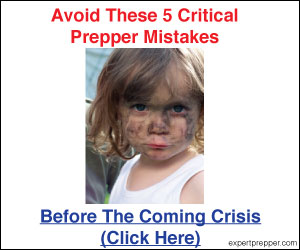Preparedness for a Flu Epidemic or Pandemic
There are many levels of preparedness - on this page are some suggestions for personal and business preparedness.
Planning Ahead
During a flu pandemic, government officials may be required to limit community movement or impose travel restrictions to help prevent the flu virus from spreading. Things to keep in mind:
- You may be asked to stay home for an extended period of time even if you are not sick.
- Schools, workplaces and public gatherings such as sporting events or worship services may close temporarily.
- Mass transportation such as subways, buses, trains and air travel may be limited. FROM AMERICAN RED CROSS WEBSITE
.......................................................................................................
GET PREPARED - LISTS
Most Basic Idea of preparedness is to stock up on some staple goods at the supermarket and pharmacy. (more detailed list below) These would include: Dried foods such as rice, pasta and beans, canned foods such as meat and veges and fruit, sugar, flour, salt, pepper, spices, dried or canned milk, tea and coffee, water, pain killers such as paracetamol and any other prescription drugs you use.
NSW State Emergency Service (NSW SES) says "Your Home Emergency Kit should contain:
- Portable radio with spare batteries
- Torch with spare batteries
- First aid kit (with supplies necessary for your household)
- Candles and waterproof matches
- Important papers including emergency contact numbers
- Copy of any Home Emergency Plans
- Waterproof bag for valuables"
Your Home Emergency Kit - Detailed also from NSW SES
Checklist for families or individuals for 2 weeks
Start stockpiling enough water and food as necessary to survive for a minimum of two weeks. This is because you may not be able to get to a shop or the shop may not have any supplies left.
Resources you may need in case of an emergency.
- Store a two week supply of water and food. *
- Check your regular prescriptions to ensure a continuous supply in your home.
- Have any nonprescription drugs on hand - pain killers, cough and cold medicines and vitamins. Examples of medical supplies:
Soap and water, or alcohol-based (60-95%) hand wash Medicines for fever, such as ibuprofen
First Aid manual
Thermometer
Tweezers
Antibiotic ointment
Anti-diarrheal medication
Fluids with electrolytes
Bandages, gauze rolls of varying widths
Cotton wool balls
Cotton buds
Saline solution
Instant ice pack
Burn cream
Disinfectant
Tissues
Toilet paper
Masks
Magnifying glass
Vitamins
* FOOD
Other necessary supplies:
-
Garbage bags
-
Water purification system or materials
-
Duct tape
-
Prescription glasses
-
Writing supplies - paper, pecil, sharpener, pens
-
Scissors - large and small
-
Sets of eating utensils
-
Paper cups, paper plates
-
Paper towels
-
Torch and batteries
-
Matches
-
Portable radio
-
Manual can opener
-
Disposable nappies if required
- water treatment tablets
- sewing kit
- toothpaste
- dental floss
- toothbrushes
-
Games, cards & books that do not need electricity
-
feminine hygiene products
........................................................................................
Other checklists are available from:
Gather Emergency Supplies Disaster Supplies Kit
FOOD - HANDY HINTS
If power is cut dairy products and meat go off after 4 hours. Frozen food lasts up to two days.
Most fruit last about seven days at room temperature.
Potatoes keep longer if stored in a cool, dark place.
Flour, muesli bars and biscuits last around six months when sealed.
Food in cans or jar lasts up to one year, unopened.
LIMIT the spread of germs and prevent infection:
Wash hands frequently with soap and water, and model the correct behavior.
Cover coughs and sneezes with tissues, and be sure to model that behavior.
Do not share eating utensils, drinking glasses or cups, towels or other personal items.
Stay away from others as much as possible if they are sick. Stay home from work and school if sick.
Wear a face mask to protect yourself in public. The World Health Organization recommends N95 type mask.
The flu can be spread 1-8 days before symptoms appear
Pandemic Planning checklist for small businesses from Australian Govt with levels
Kit for small businesses from Australian Govt to help businesses understand what a pandemic is, the impact a pandemic might have on your business, and how important it is to have a business pandemic plan in place.
Emergency Preparedness for Business Many resources from National Institute for Occupational Safety and Health (NIOSH) in USA
Pandemic influenza (flu) Information for the general public––looking after yourself in a pandemic i
includes
What is a pandemic?
How does it spread?
Can it kill people?
Prevention and control.
What to do if your sick.
What to do if a chld is sick. Department of Human Services, Victoria NSW AUSTRALIA
Recommended Book on Preparedness:
| Expert Prepper's Ultimate Survival Guide |
Emergency Preparedness and You from CDC Emergency Communication System
1. Gather emergency supplies
2. Make a Plan
3. Be Informed
Australian Red Cross Disaster and Emergency services Plan to Prepare your household including How to make a plan
Public health preparedness: The impact of pandemic influenza outbreaks can be reduced by being well prepared.
